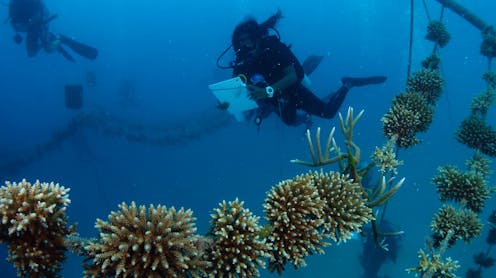
- Select a language for the TTS:
- UK English Female
- UK English Male
- US English Female
- US English Male
- Australian Female
- Australian Male
- Language selected: (auto detect) - EN
Play all audios:
April 8, 2025 Corey J. A. Bradshaw, _Flinders University_; Clelia Mulà, _The University of Western Australia_, and Giovanni Strona, _University of Helsinki_ New research examined coral
restoration projects worldwide to calculate what it would actually cost to bring back what’s already been lost. September 23, 2024 Tim Lamont, _Lancaster University_; Rindah Talitha Vida,
_Lancaster University_, and Tries Blandine Razak, _IPB University_ Creating 3D computer models of entire reefs – sometimes known as digital twins – can help researchers monitor these
precious ecosystems faster and more accurately than ever before. June 10, 2024 Mark Gibbs, _Australian Institute of Marine Science_ Around the world, coral reefs are suffering. But
scientists in high-income nations are developing new ways to build coral resilience. We have a duty to share our skills and build capacity elsewhere. May 7, 2024 Dominic McAfee, _University
of Adelaide_ and Craig Copeland, _University of Newcastle_ A clever approach to restoring Australia’s native oyster and mussel reefs in Queensland’s Moreton Bay is catching on, giving
community groups a way to get involved in their local patch. March 19, 2024 Heidi Burdett, _Umeå University_; Gavin Foster, _University of Southampton_, and Tessa M Page, _University of
Southampton_ For decades, conservationists have tried to repopulate dead reefs with corals reared elsewhere. September 20, 2023 Meryl Larkin, _Southern Cross University_; David Harasti,
_Southern Cross University_; Kirsten Benkendorff, _Southern Cross University_; Stephen D. A. Smith, _Southern Cross University_, and Tom R Davis After a chance discovery in the lab, this
team used IVF to make hundreds of coral babies for restoration projects in New South Wales. So far the IVF babies are doing well in the wild. September 14, 2023 Hillary Smith, _James Cook
University_ and David Bourne, _James Cook University_ Many researchers are exploring high-tech ways to help reefs survive the climate crisis. But low-tech solutions like manually pulling out
seaweed have a place too. July 27, 2023 Marine Gouezo, _Southern Cross University_ and Christopher Doropoulos, _CSIRO_ This knowledge is particularly important if we want to help reefs
recover devastating events such as mass bleaching and cyclones. January 26, 2023 Daniel Merino, _The Conversation_ and Nehal El-Hadi, _The Conversation_ __Restoring entire ecosystems is a
difficult and expensive process. Thankfully, certain species, called ecosystem engineers, can make restoration easier. Gaining social and political support is critical too. October 26, 2022
Dominic McAfee, _University of Adelaide_; Brittany Williams, _University of Adelaide_; Lachlan McLeod, _University of Adelaide_, and Sean Connell, _University of Adelaide_ By playing the
sounds of healthy reefs, we can draw oysters back to the barrens where their reefs once stood. May 12, 2022 Brittany Williams, _University of Adelaide_; Dominic McAfee, _University of
Adelaide_, and Sean Connell, _University of Adelaide_ Playing the sounds of the sea can attract lost baby oysters to join the restoration of oyster reefs. August 18, 2020 Jennifer Mallon,
_University of Glasgow_ Sexual reproduction helps keep coral colonies diverse and resilient. Now, scientists are doing it in a lab to restock flagging reefs. August 7, 2020 Shawna Foo,
_Arizona State University_ Hundreds of organizations are working around the world to restore damaged coral reefs. New research shows that rapid ocean warming threatens these efforts. May 9,
2019 Maria Beger, _University of Leeds_ and David Smith, _University of Essex_ A new study found shallow water corals with high temperature tolerance in their DNA. Could they make reefs more
resilient to climate change? May 2, 2019 Joanne Preston, _University of Portsmouth_ Coral reefs get a lot of attention, but the world has lost almost all of its vital oyster reefs in the
last few centuries. September 5, 2018 Peter J Mumby, _The University of Queensland_ Federal Labor has pledged to withdraw the A$443 million given to the Great Barrier Reef Foundation. But
the foundation’s decisions are led by science, and free of undue influence, its chief scientist says.








